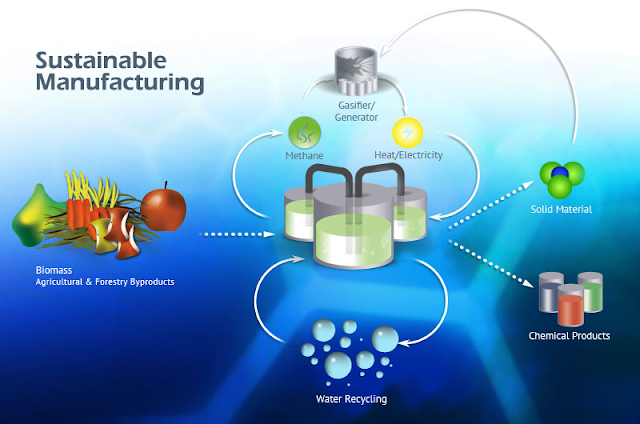Global industry is looking for alternatives to fossil fuels, as feedstocks for the production of fuels, plastics, high value chemicals, lubricants, and other materials. The planet Earth is highly prolific in its biological output -- and it could be far more biologically prolific, given just a little help.
The image above depicts the scheme of Montana startup Blue Marble Biomaterials, which aims to ride a $multimillion grant from the US Advanced Manufacturing Program to successful bio-manufacturing.
The company is implementing novel recycling systems to eliminate waste and reduce cost: a photo-bioreactor containing algae purifies wastewater and waste gas from the fermentation system and their solid waste is dried and pelletized for use in wood-burning furnaces and stoves. The company has future plans to power its facilities using its own waste gas and pelletized solid waste in already on-site gasifiers.Blue Marble had better have its act together, because government grants run out very quickly -- no matter how well connected company founders may be to government administrators. Bio-manufacture of this range of materials, using these new technologies, is risky and cutting edge.
Blue Marble Energy’s proprietary AGATE (Acid, Gas and Ammonia Targeted Extraction) system uses different bacterial consortia (“cassettes”) in an anaerobic fermentation process to produce carboxylic acids, esters, mercaptains / thiols, and terpenes. The system is feedstock flexible; for the Missoula plant, Blue Marble is using waste coffee grounds and spent grain from a major brewer, said Kelly Ogilvie, Blue Marble’s CEO.
(Blue Marble uses a supercritical fluid extraction process to remove the remaining lipids from the coffee grounds.)
The feedstock flexibility can manifest as price stability for Blue Marble’s chemical customers, Ogilvie noted. For example, the company has a stable price on the spent grain from the brewer; a waste product which otherwise would end up in landfills (i.e., the amounts above that which could economically be used for cattle feed, the other major disposal pathway for spent grain).
If we have fixed feedstock [such as the waste spent grain], we have price stability. We can hedge off the future price volatility of petroleum. Price protection is a huge issue right now._GCC
—Kelly Ogilvie
As long as petroleum prices remain relatively high, crafty uses of biomass and bio-products as substitutes for petroleum can make a profit. But to build a large-scale infrastructure of bio-manufacture and bio-refining, investors and participants will want to be sure the bio-approach can withstand temporary nose-dives of oil prices, such as occurred in 2008-2009 and multiple times throughout the 1900s.

No comments:
Post a Comment